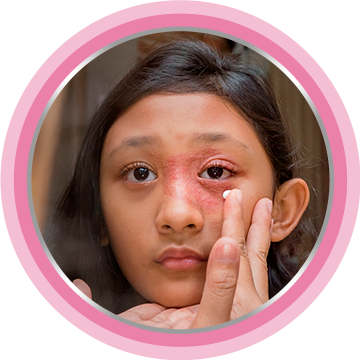Why Is My Face Itchy?
Facial reactions, red blotches, atopic dermatitis, itchy skin or rashes can be caused by a variety of reasons. These can include chronic conditions such as eczema, acne or rosacea, skin allergies, or even sensitivity to a particular substance like detergent, synthetic or rough fabrics. They can also be due to environmental factors such as too much sun exposure, changes in temperature or moisture, or air conditioning. Even stress can affect your skin. Click here to learn more about stress and eczema.
Sensitive skin, in general, is becoming a more common problem for adults, with many studies over the past decade defining what this means.1 Luckily however, many products which are specially formulated for sensitive skin have emerged in recent times.
You may want to visit a healthcare professional to help you determine why your face is itchy and to help you develop a treatment routine. Listed below are some factors that may contribute to your irritated or itchy skin, and steps you can take that may help give you some relief.

Allergies
Many substances you ingest can cause a skin allergy or skin asthma – the most common food-induced allergies come from milk, egg, peanuts, tree nuts, fish and shellfish.2 Other allergies can include reactions to dust or pollen, often referred to as hay fever or allergic rhinitis. If you think you’re suffering from an allergic reaction, it may be worth visiting your healthcare professional, however antihistamine treatments, available in most pharmacies, can help with itchy skin.3

Reactions to cosmetics
Reaction to cosmetics have been increasing, with skin, hair, nail and eye cosmetics all to blame. These reactions can range from irritations to a full skin allergy, with the face being the most common area affected. If you have sensitive skin, test new products before you use them, and if you suspect you’re having a reaction to a particular product, you may want to discontinue use.4
How to relieve irritation and itchy skin
Similar to treating eczema or other skin conditions that lead to itchiness and irritation, there are a number of steps that you can take to help find relief beyond the specific recommendations above:5
- Avoid scratching itchy skin if possible, as it can aggravate the skin, causing inflammation and infection.
- Applying cool, wet compresses can help to moisturize your skin. If your skin is dry, apply a moisturizer while the skin is still moist.
- Use mild soaps and cleaners, steering clear of anything heavily scented. This includes washing powder.
- Putting cucumber on your face can help to moisturize your skin. It can also be cool and refreshing.6
- Always wash your skin with warm water, and never hot water.
REFERENCES:
- Willis, C. M., et al. "Sensitive skin: an epidemiological study." British Journal of Dermatology 145.2 (2001): 258-263.
- Sicherer, Scott H., and Hugh A. Sampson. "9. Food allergy." Journal of Allergy and Clinical Immunology 117.2 (2006): S470-S475.
- http://www.mayoclinic.org/diseases-conditions/hay-fever/basics/treatment/con-20020827
- Mehta, Surjit Singh, and Belum Siva Nagi Reddy. "Cosmetic dermatitis–current perspectives." International journal of dermatology 42.7 (2003): 533-542.
- http://www.mayoclinic.org/diseases-conditions/itchy-skin/basics/lifestyle-home-remedies/con-20028460
- Hairong, DONG Yinmao WANG Changtao YU. "The Elementary Study of Cosmetic with Cucumber Juice [J]." Flavour Fragrance Cosmetics 3 (2007): 006.
ASC Reference No.: B018P012221BS

